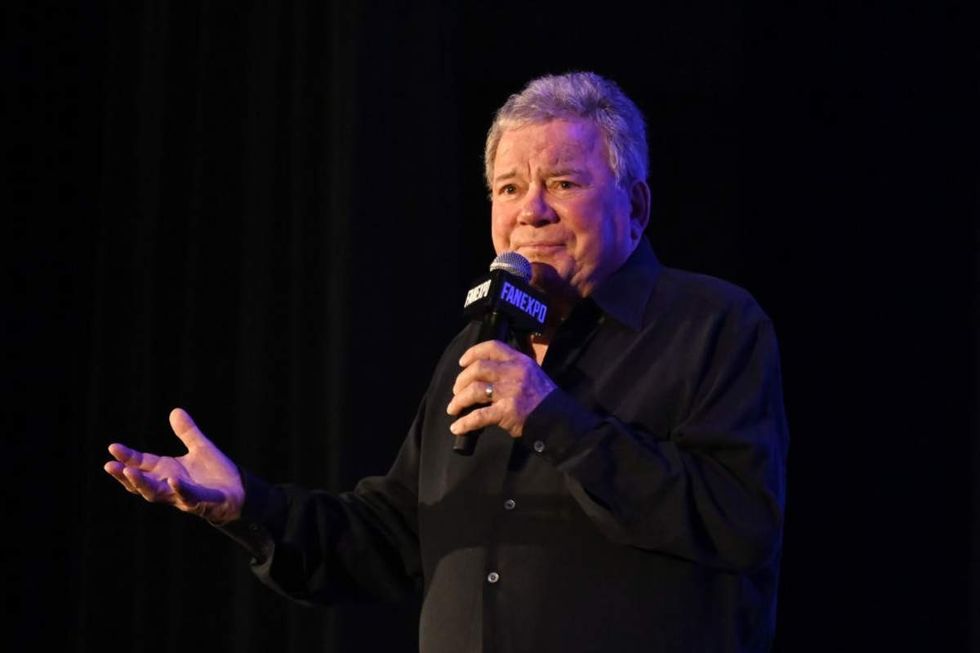In the movie “Contact,” when Jodie Foster’s character goes to space and looks outside the spaceship, she whispers, “They should’ve sent a poet.” Although outer space is often described as spectacular, "Star Trek" actor William Shatner could only feel the deepest grief after going to space at the age of 90.

In an excerpt from his book “Boldly Go: Reflections on a Life of Awe and Wonder,” shared on Variety, Shatner details how visiting space led him to a profound awakening that made him look at the Earth and humanity in a way he never imagined. Shatner became the oldest living person to travel into space, along with three other crew members, on Jeff Bezos’ Blue Origin space shuttle in October 2021. When the day of take-off arrived, he couldn’t stop thinking about the Hindenburg disaster, in which an airship crashed on May 6, 1937, in New Jersey, as per HISTORY. While his fellow passengers started enjoying the weightlessness by floating around and performing somersaults in the absence of gravity, Shatner was interested in something else.

After decades of playing a character in a science-fiction show set in space, he had anticipated that his voyage into the cosmos would be filled with thrill, adventure, and a deep connection with the universe around us. He quickly floated to the window of the shuttle to gaze into the expanse and see what was out there, but felt surprised by his own reaction. Instead of seeing beauty, he was seeing “death.”
“I love the mystery of the universe,” he wrote in his book. “[it] has thrilled me for years… but when I looked in the opposite direction, into space, there was no mystery, no majestic awe to behold... all I saw was death.” He added that what he saw was “a cold, dark, black emptiness. It was unlike any blackness you can see or feel on Earth.”
He could see the “curvature of Earth, the beige of the desert, the white of the clouds and the blue of the sky,” and that, he said, was “life.” He saw the trailing hole that their shuttle had left behind in the oxygen layer and he felt sad. He realized how fragile Earth is, and that thought made him shiver. “Everything I had thought was wrong. Everything I had expected to see was wrong,” he added.
After he returned to Earth, Shatner found himself grappling with an intense grief that emerged within his heart after what he had witnessed. "I was crying," Shatner told NPR. "I didn't know what I was crying about. I had to go off someplace and sit down and think, what's the matter with me? And I realized I was in grief." He further wrote that initially, he thought that going into space would be the ultimate catharsis and a beautiful step toward a greater understanding, but it was nothing like that. “My trip to space was supposed to be a celebration; instead, it felt like a funeral.”

There’s a scientific explanation for Shatner’s post-space-voyage emotion described as the “overview effect.” The term was coined by space philosopher Frank White in his 1987 book, according to NPR. "The overview effect is a cognitive and emotional shift in a person's awareness, their consciousness, and their identity when they see the Earth from space," White told NPR. "They're at a distance and they're seeing the Earth... in the context of the universe." According to White, almost everyone who travels to space experiences this “overview effect” that challenges their previously-held assumptions about life and the universe. An experience of space travel, he said, makes a person realize "the difference between intellectual knowledge and experiential knowledge."
Shatner told NPR that when he saw Earth from space, he wept because, from his standpoint, the Earth was dying. "It's a little tiny rock with an onion skin air around it. That's how fragile it all is. It's so fragile. We hang by a thread... we're just dangling," he said. After this powerful awakening, Shatner found a new purpose for his life. He told The Guardian, “My experience in space filled me with sadness, but also with a strong resolve. I don’t want my grandchildren to simply survive. I want them to be able to live long and prosper.” “I will do everything I can so that we can protect our one and only home,” he added, because, “the beauty isn’t out there, it’s down here, with all of us.”






















 What foods would you pick without diet culture telling you what to do?
What foods would you pick without diet culture telling you what to do?  Flexibility can help you adapt to – and enjoy – different food situations.
Flexibility can help you adapt to – and enjoy – different food situations.
 Anxious young woman in the rain.Photo credit
Anxious young woman in the rain.Photo credit  Woman takes notes.Photo credit
Woman takes notes.Photo credit 
 Revenge can feel easier than forgiveness, which often brings sadness or anxiety.
Revenge can feel easier than forgiveness, which often brings sadness or anxiety. 
 In the past two years, two malaria vaccines have become available for babies starting at 5 months of age.
In the past two years, two malaria vaccines have become available for babies starting at 5 months of age. By exploiting vulnerabilities in the malaria parasite’s defense system, researchers hope to develop a treatment that blocks the parasite from entering cells.
By exploiting vulnerabilities in the malaria parasite’s defense system, researchers hope to develop a treatment that blocks the parasite from entering cells. Created with
Created with